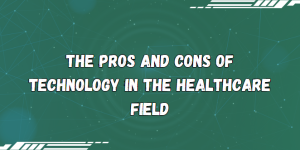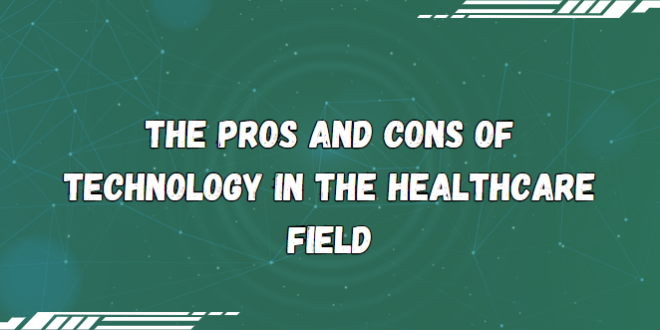The healthcare field has witnessed significant advancements in technology in recent years. These technological innovations have revolutionized the way healthcare professionals deliver care and have had a profound impact on patient outcomes. However, like any other tool, technology in healthcare has its pros and cons. In this article, we will explore the advantages and disadvantages of technology in the healthcare field.

The Pros of Technology in Healthcare
1. Improved Efficiency: Technology has streamlined various healthcare processes, such as patient registration, billing, and record-keeping, leading to improved efficiency and reduced paperwork.
2. Enhanced Communication: Technology enables seamless communication between healthcare providers, allowing for quick and efficient exchange of patient information, test results, and treatment plans.
3. Access to Information: With the advent of electronic health records (EHRs) and online medical databases, healthcare professionals have instant access to comprehensive patient information, facilitating accurate diagnoses and personalized treatment plans.
4. Telemedicine: Technology has made it possible for patients to consult with healthcare providers remotely through video calls, improving access to care, especially for individuals in remote areas or with limited mobility.
5. Medical Research and Innovations: Advanced technology has accelerated medical research and the development of innovative treatments, leading to improved patient outcomes and the discovery of new therapies.
6. Precision Medicine: Technology, such as genetic testing and molecular profiling, has enabled healthcare providers to deliver personalized treatments based on an individual’s unique genetic makeup, improving treatment efficacy.
7. Remote Monitoring: Wearable devices and mobile apps allow healthcare professionals to remotely monitor patients’ vital signs and health conditions, enabling early detection of potential health issues and timely interventions.
8. Patient Engagement: Technology has empowered patients to actively participate in their healthcare through access to online health portals, educational resources, and mobile health apps, fostering better engagement and self-management.
9. Automation: Technology has automated various repetitive tasks in healthcare, such as medication dispensing and appointment scheduling, freeing up healthcare professionals’ time to focus on critical and complex tasks.
10. Medical Education and Training: Technology has revolutionized medical education and training, providing immersive virtual simulations, online learning platforms, and teleconferencing capabilities, enhancing the skills and knowledge of healthcare professionals.
The Cons of Technology in Healthcare
1. Privacy and Security Concerns: The digitization of patient information raises concerns about data breaches and unauthorized access, necessitating robust security measures to protect sensitive medical records.
2. Costly Implementations: Adopting and maintaining advanced technology in healthcare can be expensive, requiring significant investments in infrastructure, equipment, and staff training.
3. Technical Challenges: Healthcare organizations may face technical challenges, such as system downtime, interoperability issues, and software glitches, which can impact the delivery of care and patient satisfaction.
4. Dependency on Technology: Overreliance on technology can lead to a loss of human touch and empathy in patient interactions, potentially affecting the patient experience and the therapeutic relationship.
5. Learning Curve: Healthcare professionals may require additional training and support to effectively use new technologies, which can initially slow down workflow and increase the learning curve.
6. Ethical Dilemmas: The use of certain technologies, such as artificial intelligence and robotic surgery, raises ethical dilemmas surrounding patient autonomy, privacy, and the potential for human error.
7. Health Inequalities: Not all individuals have equal access to technology, leading to potential disparities in healthcare outcomes and exacerbating existing health inequalities.
8. Potential for Misdiagnosis: Despite technological advancements, there is still a risk of misdiagnosis or reliance on inaccurate data, emphasizing the importance of critical thinking and human expertise in healthcare.
9. Information Overload: The abundance of health information available online can overwhelm patients and healthcare professionals, making it challenging to distinguish reliable sources from misinformation.
10. Technological Obsolescence: Technology evolves rapidly, and healthcare organizations must continuously upgrade their systems to stay current, which can be time-consuming and costly.
Conclusion
Technology has undoubtedly transformed the healthcare field, offering numerous benefits and opportunities. From improved efficiency and communication to enhanced patient engagement and precision medicine, the advantages of technology in healthcare are substantial. However, challenges such as privacy concerns, high implementation costs, and technical issues need to be addressed to ensure the effective and ethical use of technology. By carefully weighing the pros and cons, healthcare organizations can leverage technology to provide better care and improved patient outcomes.
Thank you for reading our article on the pros and cons of technology in the healthcare field. We hope you found it insightful and informative. Stay tuned for more interesting articles in the future!
 Spacetimes A collection of the latest news and information from various trusted sources
Spacetimes A collection of the latest news and information from various trusted sources
